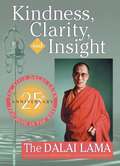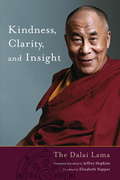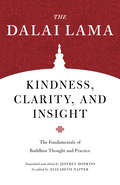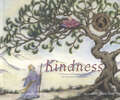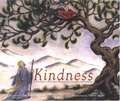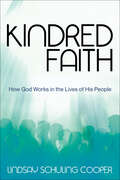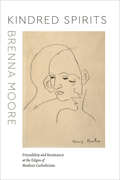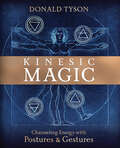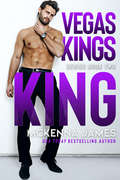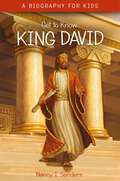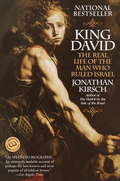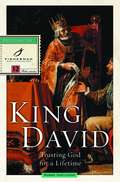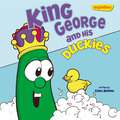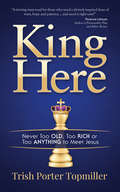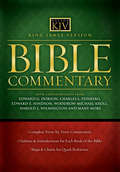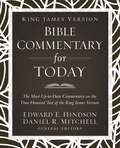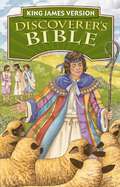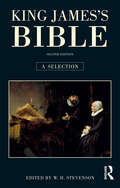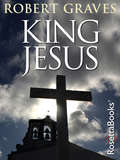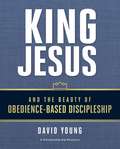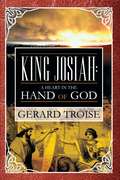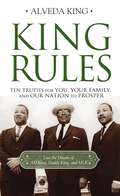- Table View
- List View
Kindness, Clarity, and Insight
by Dalai Lama Jeffrey HopkinsThese edited versions of the Tibetan Buddhist leader's lectures in the US in 1979 and 1981 and Canada in 1980 are reissued to commemorate their first publication 25 years ago. In them, the Dalai Lama presents basic Buddhist doctrines in a development sequence. Notes and 24 pages of photos are included, but no index. Annotation ©2006 Book News, Inc., Portland, OR (booknews.com)
Kindness, Clarity, and Insight
by Jeffrey Hopkins His Holiness the Dalai Lama Elizabeth NapperThis beloved classic brings together in one volume all the major themes of the Dalai Lama's teachings. Drawn from the lectures he gave during his first three visits to North America, the book covers the core subject matter of Tibetan Buddhism, as presented for the first time to an English-speaking audience. The chapters are arranged developmentally from simple to complex topics, which include the luminous nature of the mind, the four noble truths, karma, the common goals of the world's religions, meditation, deities, and selflessness. Central to all these teachings is the necessity of compassion--which the Dalai Lama says is "the essence of religion" and "the most precious thing there is."
Kindness, Clarity, and Insight: The Fundamentals of Buddhist Thought and Practice (Core Teachings of Dalai Lama)
by The Dalai LamaThis beloved classic brings together in one volume all the major themes of the Dalai Lama's teachings such as religious values, the four noble truths, karma, compassion, and meditation.Drawn from the lectures he gave during his first three visits to North America, the book covers the core subject matter of Tibetan Buddhism, as presented for the first time to an English-speaking audience. The chapters are arranged developmentally from simple to complex topics, which include the luminous nature of the mind, the four noble truths, karma, the common goals of the world's religions, meditation, deities, and selflessness. Central to all these teachings is the necessity of compassion--which the Dalai Lama says is "the essence of religion" and "the most precious thing there is."
Kindness: A Treasury of Buddhist Wisdom for Children and Parents
by Sarah ConoverThis collection of Buddhist stories conveys the teachings of Buddha in a very interesting and easily understandable language. It suits all age groups irrespective of religion or creed.
Kindred Faith: How God Works in the Lives of His People
by Lindsay Schuling CooperThis volume shares the stories of 120 people whose lives were changed thanks to their personal relationship with Jesus Christ.In 2014, Lindsay Schuling Cooper made a New Year’s resolution to read the Bible from beginning to end. Her eagerness to read daily turned into pure joy. In February she began praying to God, “Lord, use me to do your works.” Then Lindsay received her assignment.In June of 2015, Lindsay began interviewing people, asking two questions: “What can you say about God?” and “How has He changed your life or worked in it?”. She planned on interviewing fifty people. Within three months, that number grew to 120. Lindsay started out in her comfort zone, but God led her elsewhere. She met with people in churches, shelters, and even jails. Kindred Faith shares the stories of the people she met—stories of God’s people, whose faith in Him impacted their lives.
Kindred Spirits: Friendship and Resistance at the Edges of Modern Catholicism (Class 200: New Studies in Religion)
by Brenna MooreKindred Spirits takes us inside a remarkable network of Catholic historians, theologians, poets, and activists who pushed against both the far-right surge in interwar Europe and the secularizing tendencies of the leftist movements active in the early to mid-twentieth century. With meticulous attention to the complexity of real lives, Brenna Moore explores how this group sought a middle way anchored in “spiritual friendship”—religiously meaningful friendship understood as uniquely capable of facing social and political challenges. For this group, spiritual friendship was inseparable from resistance to European xenophobia and nationalism, anti-racist activism in the United States, and solidarity with Muslims during the Algerian War. Friendship, they believed, was a key to both divine and human realms, a means of accessing the transcendent while also engaging with our social and political existence. Some of the figures are still well known—philosopher Jacques Maritain, Nobel Prize laureate Gabriela Mistral, influential Islamicist Louis Massignon, poet of the Harlem renaissance Claude McKay—while others have unjustly faded from memory. Much more than an idealized portrait of a remarkable group of Catholic intellectuals from the past, Kindred Spirits is a compelling exploration of both the beauty and flaws of a vibrant social network worth remembering.
Kindred Spirits: Friendship and Resistance at the Edges of Modern Catholicism (Class 200: New Studies in Religion)
by Brenna MooreKindred Spirits takes us inside a remarkable network of Catholic historians, theologians, poets, and activists who pushed against both the far-right surge in interwar Europe and the secularizing tendencies of the leftist movements active in the early to mid-twentieth century. With meticulous attention to the complexity of real lives, Brenna Moore explores how this group sought a middle way anchored in “spiritual friendship”—religiously meaningful friendship understood as uniquely capable of facing social and political challenges. For this group, spiritual friendship was inseparable from resistance to European xenophobia and nationalism, anti-racist activism in the United States, and solidarity with Muslims during the Algerian War. Friendship, they believed, was a key to both divine and human realms, a means of accessing the transcendent while also engaging with our social and political existence. Some of the figures are still well known—philosopher Jacques Maritain, Nobel Prize laureate Gabriela Mistral, influential Islamicist Louis Massignon, poet of the Harlem renaissance Claude McKay—while others have unjustly faded from memory. Much more than an idealized portrait of a remarkable group of Catholic intellectuals from the past, Kindred Spirits is a compelling exploration of both the beauty and flaws of a vibrant social network worth remembering.
Kindred Spirits: Friendship and Resistance at the Edges of Modern Catholicism (Class 200: New Studies in Religion)
by Brenna MooreKindred Spirits takes us inside a remarkable network of Catholic historians, theologians, poets, and activists who pushed against both the far-right surge in interwar Europe and the secularizing tendencies of the leftist movements active in the early to mid-twentieth century. With meticulous attention to the complexity of real lives, Brenna Moore explores how this group sought a middle way anchored in “spiritual friendship”—religiously meaningful friendship understood as uniquely capable of facing social and political challenges. For this group, spiritual friendship was inseparable from resistance to European xenophobia and nationalism, anti-racist activism in the United States, and solidarity with Muslims during the Algerian War. Friendship, they believed, was a key to both divine and human realms, a means of accessing the transcendent while also engaging with our social and political existence. Some of the figures are still well known—philosopher Jacques Maritain, Nobel Prize laureate Gabriela Mistral, influential Islamicist Louis Massignon, poet of the Harlem renaissance Claude McKay—while others have unjustly faded from memory. Much more than an idealized portrait of a remarkable group of Catholic intellectuals from the past, Kindred Spirits is a compelling exploration of both the beauty and flaws of a vibrant social network worth remembering.
Kinesic Magic: Channeling Energy with Postures & Gestures
by Donald TysonChannel the Root Energies of the Universe with an Approach to Magic Unmatched in Elegance and PowerDiscover a system of magic that you can use to create any ritual, any charm, any spell you need in your life…with no special tools required. Kinesic magic is a new approach to Western magic that uses body postures and hand gestures to channel and utilize the fundamental esoteric forces. This book includes the basic postures and gestures as well as numerous practical exercises to master them. Renowned occultist Donald Tyson also shares a range of complete rituals—from simple to complex—for calling forth the powers of the elements and planets, commanding spirits, healing the body and mind, and more.Magical systems often require the use of tools, altars, jewelry, or other accoutrements. Kinesic magic simply uses twenty-four hand gestures and twenty-four basic postures to invoke, direct, concentrate, project, and banish powerful magical forces. This unique system connects your physical and mental energies with the five elements, the seven planets of traditional astrology, and the twelve signs of the zodiac. This magic of the empty hand can be used anytime, anywhere for remarkable magical results.
King (Vegas Kings #2)
by Mckenna JamesAnyone but him. He’s a world famous Rockstar. A player.He’s also my brother’s best friend.King is selfish, arrogant, cocky. He’s everything I’m not.But when he walks into a room, it feels like it’s just the two of us,and when he kisses me—I forget all the reasons we shouldn’t be together.My friend Ellie says starting something with King would be a bad decision,But what if he and I are meant to be, and I don't give our love a chance?Wouldn’t that be even worse?Anyone but her. My best friend Jack has one rule; no messing around with his little sister.I can’t blame the guy. When it comes to breaking women's hearts, I’m the worst.But Piper has turned my world upside down, and I’m afraid it’s me who’s going to wind up getting hurt this time.She’s far too good for me, but when I’m with her, I start to believe I can be the man she deserves.People can change, right?I can change…Unless my best friend kills me first.
King David (Get to Know)
by ZondervanA Shepherd and A KingDavid lived an adventurous life. He protected his family&’s sheep from lions and bears. He fought a giant with just a sling and stone. He even spent years hiding from men who were trying to kill him. And eventually, David became a great king. But David was also a man of God. Learn more about this hero from the Bible and his exciting place in history. Discover what it was like to grow up in ancient Israel and then be a king of God&’s people. King David—part of the Get to Know series—will teach you everything you need to know about an imperfect young man whom God used to do great things!
King David: The Real life of the Man Who Ruled Israel
by Jonathan KirschDavid, King of the Jews, possessed every flaw and failing a mortal is capable of, yet men and women adored him and God showered him with many more blessings than he did Abraham or Moses. His sexual appetite and prowess were matched only by his violence, both on the battlefield and in the bedroom. A charismatic leader, exalted as "a man after God's own heart," he was also capable of deep cunning, deceit, and betrayal. Now, in King David: The Real Life of the Man Who Ruled Israel, bestselling author Jonathan Kirsch reveals this commanding individual in all his glory and fallibility. In a taut, dramatic narrative, Kirsch brings new depth and psychological complexity to the familiar events of David's life--his slaying of the giant Goliath and his swift challenge to the weak rule of Saul, the first Jewish king; his tragic relationship with Saul's son Jonathan, David's cherished friend (and possibly lover); his celebrated reign in Jerusalem, where his dynasty would hold sway for generations. Yet for all his greatness, David was also a man in thrall to his passions--a voracious lover who secured the favors of his beautiful mistress Bathsheba by secretly arranging the death of her innocent husband; a merciless warrior who triumphed through cruelty; a troubled father who failed to protect his daughter from rape and whose beloved son Absalom rose against him in armed insurrection. Weaving together biblical texts with centuries of interpretation and commentary, Jonathan Kirsch brings King David to life in these pages with extraordinary freshness, intimacy, and vividness of detail. At the center of this inspiring narrative stands a hero of flesh and blood--not the cartoon giant-slayer of sermons and Sunday school stories or the immaculate ruler of legend and art but a magnetic, disturbingly familiar man--a man as vibrant and compelling today as he has been for millennia.
King David: Trusting God for a Lifetime (Fisherman Bible Studyguide Series)
by Robbie CastlemanFisherman Bible Studyguides have been a trusted name in Bible study for almost thirty years. With outstanding authors, an emphasis on personal growth, and over eighty titles, the Fisherman guides offer a breadth and depth of biblical study not found in any other series. Fisherman are written with a commitment to the unique authority of the Bible in our lives. Nondenominational, nonsectarian, and suitable for new Christians and mature Christians, Fisherman have a broad appeal with a biblical base. King David: Trusting God for a Lifetime, a twelve-week Bible character study, takes an in-depth look at the person referred to in Scripture as "a man after God's own heart," giving insight into how to cope with conflict and depression, how to maintain personal integrity, and how to trust God for a lifetime.
King George and His Duckies / VeggieTales (Big Idea Books / VeggieTales)
by Cindy KenneyKing George learns that being selfish just doesn't pay, so he decides to give all of his duckies away to the children of his kingdom. With the help of his friend Louis, King George shows love and shares with the others. Another VeggieTales classic with Bob and Larry, King George and His Duckies will be a young reader favorite.
King Here: Never Too Old, Too Rich or Too Anything to Meet Jesus
by Trish Porter TopmillerKing Here is the eye-opening true story of God’s unfolding plan to bring a rich man through the “eye of the needle”. Trusting God and sharing Jesus with aging parents can be difficult. As Trish Porter Topmiller watched her father’s casket be lowered into the ground, she knew the complicated jigsaw puzzle of his life finally held the missing piece—Jesus. But for years, his life seemed as far away from grace, and a believing faith in God, as a person can be. A multimillionaire entrepreneur who believed his financial fortress (and business acumen) was invincible, he turned into a workaholic adrenaline junkie—and ultimate opioid statistic who had given up on life. Even then, grace found him.King Here offers hope that no matter how old, how rich or how addicted someone is, it’s never too late to meet Jesus. Trish shares her father’s inspiring, yet tragic life story—filled with adventure and color and unique escapades—to reveal God’s plan for an old rich man who thought he had no need for God. Stepping back to see the big picture brings to light the hope and joy that God truly can answer prayers and do the impossible, but it doesn’t always look the way readers expect. In this moving tribute to her father, Trish encourages readers to never give up on loved ones who seem “too far gone” for God to reach.
King James VI and I and the Reunion of Christendom
by W. B. PattersonThis is a historical study of the career of King James VI and I, as king of Scotland (1567-1625) and England (1603-1625), who achieved a union of the crowns as the first king of Great Britain, and who undertook to end the recurring religious wars. His peacemaking by diplomatic means was complemented by his efforts to foster closer relations among the churches. The peace that he helped to maintain by these initiatives, though cut short by the coming of the Thirty Years' War, was immensely beneficial both to Britain and to the other countries of Europe.
King James Version Bible Commentary
by Ed HindsonThe King James Version Bible Commentary is a complete verse-by-verse commentary. It is comprehensive in scope, reliable in scholarship, and easy to use. Its authors are leading evangelical theologians who provide practical truths and biblical principles. Any Bible student will gain new insights through this one-volume commentary based on the timeless King James Version of the Bible.
King James Version Bible Commentary for Today: The most up-to-date commentary on the time-honored text of the King James Version
by Thomas NelsonEvery generation seeks to apply the Bible's timeless truth about God to its context. The King James Version Bible Commentary for Today is just that--the most up-to-date commentary on the time-honored text of the King James Version written by a trusted team of conservative scholars. This volume approaches the Bible with humility and respect as they explore its meaning for our generation.The King James Version Bible Commentary for Today provides readers and students of the Bible with clear explanations of the antiquated English vocabulary of the King James text as well as the Hebrew, Aramaic, and Greek words that form the original languages of the Bible. It also focuses on the intended meaning of the original authors, providing linguistic, historical, and archaeological insights that illuminate the biblical text for seasoned and new Bible readers.Features include:New material by respected scholarsThe best in conservative scholarship from multiple denominationsIlluminating verse-by-verse expositions that shed light on the meaning of ScriptureNontechnical and jargon free--no need to know Hebrew or Greek14 maps help readers understand the world of the Old Testament and New Testament
King James Version Discoverer's Bible, Revised Edition
by ZonderkidzA LARGE-PRINT Bible for kids. The King James Version Discoverer’s Bible offers the full text of the KJV translation—just like the one Mom and Dad use—in an easy-to-read, large-print (11.5 point) type. Included are 30 pages of Bible helps and full-color illustrations of important Bible scenes. Features include: • Complete KJV text of the Bible • Large-print type for easier reading • 30 pages of full-color Bible helps and illustrations of important Bible scenes • Concordance to help you find Bible words and verses • Color maps to help you locate key Bible places • Presentation page for personalizing and gift giving • Words of Christ in red
King James's Bible: A Selection
by W. H StevensonWithout an understanding of Biblical stories, readers lose out on much of the richness of English literature, as authors from Milton through T.S. Eliot to Jeanette Winterson draw inspiration from Biblical stories in their own writing. This user-friendly annotated selection of key passages from the King James’s Bible clarifies the key themes, characters, stories and genealogies for students, offering timelines, a bibliography, and a detailed index for quick and easy reference. The original 1984 version, of which this is a revised edition, was written by Bill Stevenson as a response to his students' difficulty with biblical references in literature - a selection from the King James’s Bible that would give the student a notion of what the book contains, including the history of the 1611 text, the strands of imagery that bind the whole together. It gives the student a brief overview of the political, historical and religious contexts of the stories in the Bible as well as a brief history of the different versions of the Bible.
King Jesus (FSG Classics)
by Robert Graves&“Both the knowledge of a scholar and the imagination of a poet are brought to bear upon Jesus as child, boy, and man. . . . A bold speculative adventure&” (Harold Brighouse, Manchester Guardian). In Robert Graves&’s unique retelling, Jesus is very much a mortal and the grandson of King Herod the Great. When his father runs afoul of the king&’s temper and is executed, Jesus is raised in the house of Joseph the Carpenter. The kingdom he is heir to, in this version of the story, is very much a terrestrial one: the Kingdom of Judah. Graves tells of Jesus&’s rise as a philosopher, scriptural scholar, and charismatic speaker in sharp detail, as well as his arrest and downfall as a victim of pitiless Roman politics. Bringing together his unparalleled narrative skill and in-depth expertise in historical scholarship, renowned classicist and historical novelist Robert Graves brings the story of Jesus Christ to life in a strikingly unorthodox way, making this one of the most hotly contested novels Graves ever wrote—and possibly one of the most controversial ever written. It provides a fascinating new twist to a well-known story, one that fans of this historical period are sure to love. &“This is not reading for the easily shocked; it definitely presents Jesus as a sage and a [poet], if not divine. It moves, as does all Mr. Graves&’ writing, at a brilliant fast pace, and with a tremendous style.&” —Kirkus Reviews
King Jesus and the Beauty of Obedience-Based Discipleship
by David YoungWhat does it mean to be a disciple? The call of discipleship is more than programs and Bible study. In King Jesus and the Beauty of Obedience-Based Discipleship, David Young presents a bold call for obedience-based discipleship and argues that it alone is the proper response to the kingship of Jesus. Many have wrongly associated obedience with bad theology, believing that Jesus' demand for obedience is a form of works righteousness or legalism. Others simply don't like obedience and resist the demands Jesus makes in calling us to follow him.But if we surrender to the kingship of Jesus, we will find the life we were designed to live. We are accustomed to calling Jesus "Savior." And we should. But until recently, many in the Western church have not learned to call Jesus "King."The kingship of Jesus has implications for how we live. We can either rebel against him, raising puppet kings and constructing our own kingdoms, or we can submit to him in obedience-based discipleship. Could it be that you are still sitting on the throne of your life, treating King Jesus as a mere advisor? What would change in your life if you started treating Jesus as nothing short of your King?Young unpacks five principles for those who wish to follow Jesus as King.Surrender to the authority of King JesusEmbrace the mission of King JesusLive immersed in King JesusObey the teachings of King JesusBehold the presence of King JesusFollowing these five steps awakens us to a life truly worth living, a life of power, peace, beauty, and love. This is eternal life, that we would know and follow Jesus as King of the Universe, and king over our lives. After all, you don&’t merely believe in kings. You obey them.
King Josiah
by Gerard TroiseAfter the death of King Solomon, things went from bad to worse over time for the divided nation of Israel. As many self-serving rulers led the people of God's covenant into a wide diversity of idolatry, false worship and deception. Even so, a faithful remnant of Judeans held firmly to an obscure prophecy spoken by a man of God at Bethel centuries before about a coming son, "Josiah by name", who would be born to the house of David and would desecrate and destroy the altars of idolatry, leading the people back to their exalted place of true heritage (I Kings 13:1-2). Follow this young and heroic son of David along the epic journey of his life and through the many experiences that forged him into the great man that he was; A man who refused to rest content until he had obtained God's very best for himself and for the covenant people of his generation!
King Rules: Ten Truths for You, Your Family, and Our Nation to Prosper
by Alveda KingIn King Rules, the niece of Dr. Martin Luther King Jr. shares that message in a deeply personal collection of hard-learned lessons, timeless truths, and foundational principles. Dr. Alveda King's words are lovingly crafted yet refreshingly blunt at a time when bluntness is needed to counter the forces of moral drift and empty relativism. Beginning with a vulnerable admission of her own wounds and wanderings, Alveda unfolds eleven core values that have guided her family through generations of triumph and tragedy--and have played a pivotal role in fostering revolutionary change in society.Out of a heart of compassion, she dispenses wise meditations on bedrock subjects including faith and family, peace and justice, education and civic life. With thoughtful conviction she also boldly tackles topics considered divisive in our postmodern world, from abortion and sexuality to gun control and marriage laws. The King Rules is a page-turning narrative that blends eyewitness history with grandmotherly wisdom. And as J. C. Watts writes in the Foreword, the book is "more than Alveda's story, it's an account of the beliefs that redirected the course of a nation, that left us a legacy, and that hopefully will guide us again."
